Can Dogs Eat Marshmallows? No, But Here Are 2 Kinds Dogs CAN Eat
As a sweet treat, nothing is as yummy as a marshmallow (especially in a s’more). Squishy, sticky fluffy deliciousness, marshmallows are a delightful way for people to indulge in a bit of sugar. But what about dogs? Can dogs eat marshmallows? Are marshmallows bad for dogs?
I know it seems crazy. Who gives their dogs marshmallows anyway? But a quick search shows that there are over 12,000 Google searches per month on “Can Dogs Eat Marshmallows.” It seems like everyone wants to know–are marshmallows ok for dogs?
The safest, shortest answer is no, dogs cannot eat most marshmallows. There are a wide range of brands on the market, and the simple fact is that a majority of them contain at least one ingredient that is toxic or harmful to dogs.
Keep scrolling to find out 2 kinds of marshmallows that are safer for dogs. I’m not saying that any marshmallows are good for dogs but at least these won’t send them to the hospital.
Why Can’t Dogs Eat Marshmallows?

There are a few reasons why dogs should not eat marshmallows. Beyond the basic ingredients, marshmallows are extremely unhealthy.
But Can dogs eat marshmallows that are entirely free of the bad stuff? Yes, if you find the right ones. If you take a 100 calorie marshmallow from a pet-safe, xylitol-free marshmallow brand, you’ll find that 97 calories will be nothing but sugar and filler!
For both dogs and people, a treat that’s 97% fluff isn’t healthy. Just as we, as humans, need to moderate our own diets, we need to do the same for our pets.
However, in the quest to determine whether or not dogs can eat marshmallows, it’s useful to understand why they shouldn’t, and to answer another important question: will marshmallows hurt a dog? And scariest of all, can a marshmallow kill a dog? Here are 5 reasons.
1. Xylitol

When determining whether marshmallows are toxic to dogs, the most immediate cause for concern when feeding your dog marshmallows is xylitol. This substance is classified as a natural sweetener and is commonly used as a replacement for sugar. For humans, this offers us the chance to enjoy something sweet without the known ramifications of excessive sugar intake, but the same is not true for our canine companions.
The Food and Drug Administration has released a comprehensive explanation of why xylitol is toxic to pups. Unlike people, when dogs digest xylitol, it causes a massive and rapid release of insulin into their blood. As a result, the dog’s blood sugar drops. This is known as hypoglycemia, and it sets in 10–60 minutes after xylitol is first ingested.
In addition to marshmallows, there are an array of products that contain xylitol, including:
- Mouth wash
- “Reduced fat”, “no sugar”, and “sugar-free” variants of sweet treats
- Some toothpaste
- Some brands of peanut butter
- A large amount of “diet” foods
- Breath mints and chewing gum
- Sugar-free desserts, particularly “skinny” ice cream
Symptoms of Xylitol Poisoning
It doesn’t take a lot of xylitol to endanger the life of your beloved buddy! If your dog ever eats anything that may contain xylitol, such as a marshmallow, it’s best to act first and worry later. Even before symptoms appear, it’s best to call poison control or a veterinarian. The symptoms of xylitol poisoning in dogs are:
- Vomiting
- Lethargy
- Lack of appetite
- Sudden collapse
- Difficulty walking
So, remember, if you’re wondering “are marshmallows dangerous for dogs?” be sure to check the ingredients for xylitol.
See also The Starbucks Puppuccino + 15 Places to Get FREE Pup Cups
2. Sugar & Corn Syrup

Marshmallows that do not contain xylitol will often contain sugar or corn syrup. While neither of these ingredients are necessarily toxic to dogs, they’re certainly not healthy! Dogs, like people, need to have a balanced diet, and marshmallows do not factor into a well-rounded puppy meal plan.
Should Dogs Eat Sugar?
While a well-rounded canine diet will typically include some sugar, this sweet flavoring is not something that should be artificially introduced. As with people, a sweet-toothed dog risks familiar ailments such as cavities, obesity, and diabetes. Prolonged exposure to excessive sugar can even cause metabolic changes in a dog, which may result in altered moods and energy levels.
Should Dogs Eat Corn Syrup?
Corn syrup poses the same risks as sugar. Dogs with an excessive amount of corn syrup in their diet are just as prone to diabetes and weight gain as dogs with excessive sugar.
Both sugar and corn syrup are technically safe for dogs to eat. In exceedingly small amounts, it is fine to feed your dogs sugar and corn syrup, but it should never be provided in excess. Larger dogs will be able to handle more than small dogs, but all dogs must be closely monitored for signs of diabetes and hypoglycemia.
3. Artificial Flavors & Dyes
Another thing to watch out for is artificial coloring. There are a variety of brands on the market that mix a bit of flavoring into their marshmallows. In some cases, they may even dye the marshmallows different colors. While these components, often labeled with names such as “Red 40” or “Blue 2”, are not necessarily harmful, they’re not something you want your dog to ingest in excess.
Similarly, there are some brands and varieties of marshmallows that contain artificial flavoring. Again, most of these ingredients are safe. However, you don’t want your dog chewing on something that’s packed with artificial flavors and chemicals.
4. Preservatives
There are some chemicals, like xylitol, that are perfectly safe for humans but harmful to dogs. Three major marshmallow preservatives fall into this category: BHA, BHT, and ethoxyquin. All three of these products are and have been used to boost the shelf life of marshmallows, which are prone to rapid hardening and spoilage without additional preservatives.
It should be noted that these preservatives make up an extremely small portion of a marshmallow’s ingredients. In fact, per federal regulations, ethoxyquin can be no more than 0.5% of a marshmallow’s total composition. Nonetheless, it’s often safer to avoid these ingredients altogether.
If a dog consumes an excessive amount of marshmallows, that small percentage can add up. All three of these preservatives are known to exacerbate allergies. Studies suggest that BHA, BHT, and ethoxyquin may even cause dogs to develop new allergies.
See also Puppuccino Recipe from Pet Chef Rocky Kanaka
5. Choking Risk
Even a perfect marshmallow that meets every requirement to be dog-friendly will have one final trick up its sleeve. Unless properly cut up and served as tiny bite-sized pieces, many marshmallows pose a huge choking risk for dogs. For particularly small dogs and toy breeds, even a miniature marshmallow can be a choking hazard.
Are There Safer Marshmallows for Dogs?

If you really want to give your dog a marshmallow, these options will be safer for your dog.
1. Max Vegan Mallow – sugar free, xylitol free, no artificial flavors

Of all of the marshmallows brands I looked at these seem to be the safest. They DON’T contain xylitol, theu’re sugar free, gluten free, soy free and non GMO. The flavor is natural, and the preservative is made from seaweed. It also contains MCT oil which is super healthy. The sweetner is allulose which is a natural sugar found in figs, dates and raisins. It isn’t toxic to dogs according to The Journal Of Veterinary Medical Science. NOTE: You MUST buy the vegan version. Their normal one has xylitol which is toxic to dogs.
Can dogs eat marshmallows? Yes, they can eat these in moderation. You can buy these healthier marshmallows on Amazon.
2. Make Your Own Marshmallows
Good news! We found two recipes that would be safer for your dog. Bad news, you have to make them yourself. But just think of the fun you’ll have and the peace of mind knowing that your dog is getting a safe ‘mallow. Each of these uses a different sweetener.
1. Honey Or Maple Syrup Marshmallows
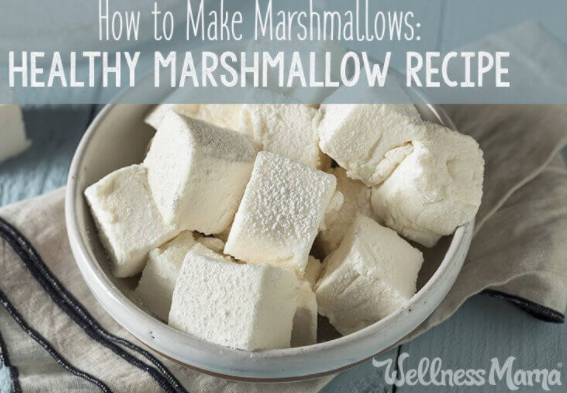
This recipe from Wellness Mama takes about 25 minutes to make from start to finish. I love it because it also includes marshmallow root powder which is a wonderful anti inflammatory.
Ingredients
- 1 TBSP marshmallow root powder (optional)
- 1 cup water (warm, divided)
- ¼ cup gelatin powder
- 1 cup honey (or maple syrup)
- 2 tsp vanilla
Get the full instructions from Wellness Mama
2. Monk Fruit Marshmallows
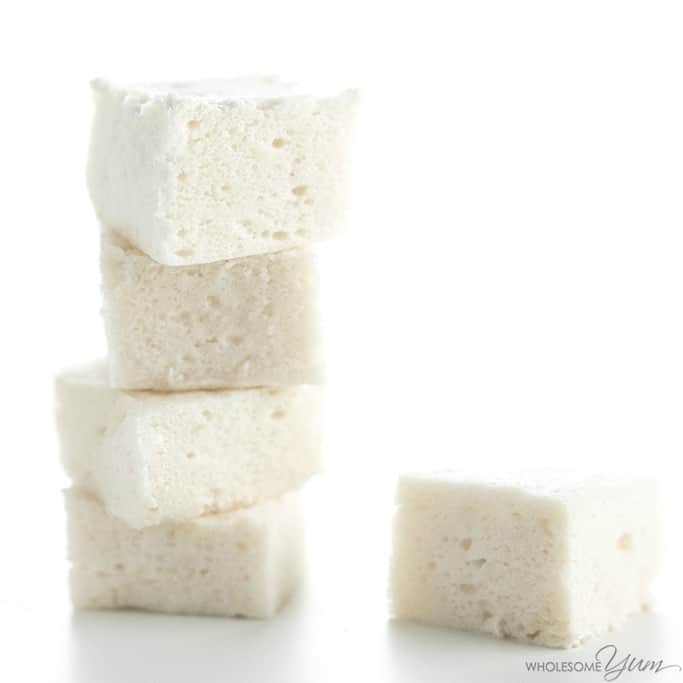
This next recipe is from Wholesome Yum. These sugar free marshmallows only have three ingredients
- Gelatin powder
- Monk Fruit Blend
- Vanilla
Get the full instructions from Wholesome Yum
What to Do If Your Dog Eats A Marshmallow WIth Xylitol?
If in the process of baking something, your dog scoops up a few miniature xylitol-free marshmallow, it isn’t an emergency. If your dog eats any amount of xylitol, it is automatically a veterinary emergency.
Call Your Vet
Should your beloved pooch eat more than a few marshmallows in a single sitting, then the best course of action is to consult with a veterinarian. While it is preferable to call your veterinarian, any available professional is a valid choice.
Remember: never try and treat the problem yourself! You are likely to do far more harm than good. In addition to the stress this will cause your pet, trying to medicate or treat your dog alone is likely to result in injuries to both parties.
See also Top 3 Dog Foods for Healthy Huskies
Call the Pet Poison Hotline
If no vets are available to help, then it’s time to try another resource. The Pet Poison Hotline is an amazing resource, and it operates 24/7. They may be reached at (855) 764-7661. When contacted, their expert team will walk you through what to do and how to address the issue. This may involve bringing your dog to a professional all-hours emergency clinic.
Better Sweet Treats for Your Pooch
If you want your dog to experience the sweet deliciousness of a marshmallow, then there are much safer options available. In addition to pre-made treats and baked goods, you can treat your pooch to natural foods!
Fruits

There are many fruits on this planet, and many of them are perfectly safe for your dog to eat. In addition to their sweet taste, many fruits also offer a few nutritional benefits to dogs. To replace a marshmallow, some of the best picks are:
- Seedless watermelon without the rind
- Frozen orange slices
- Apples
Puppuccinos

For owners with their hearts set on a sweet treat for a very special occasion, then the puppuccino is your best bet. You can purchase them at a store, but the best way to provide a puppuccino is to make it yourself! Rocky’s famous pumpkin puppuccino is specially formulated for dogs, so it won’t cause any tummy aches afterward!
FAQ
What is the highest quality food for dogs?
The three foods that are super healthy and that almost every dog loves, even the pickiest dogs, are:
1. The Farmer’s Dog.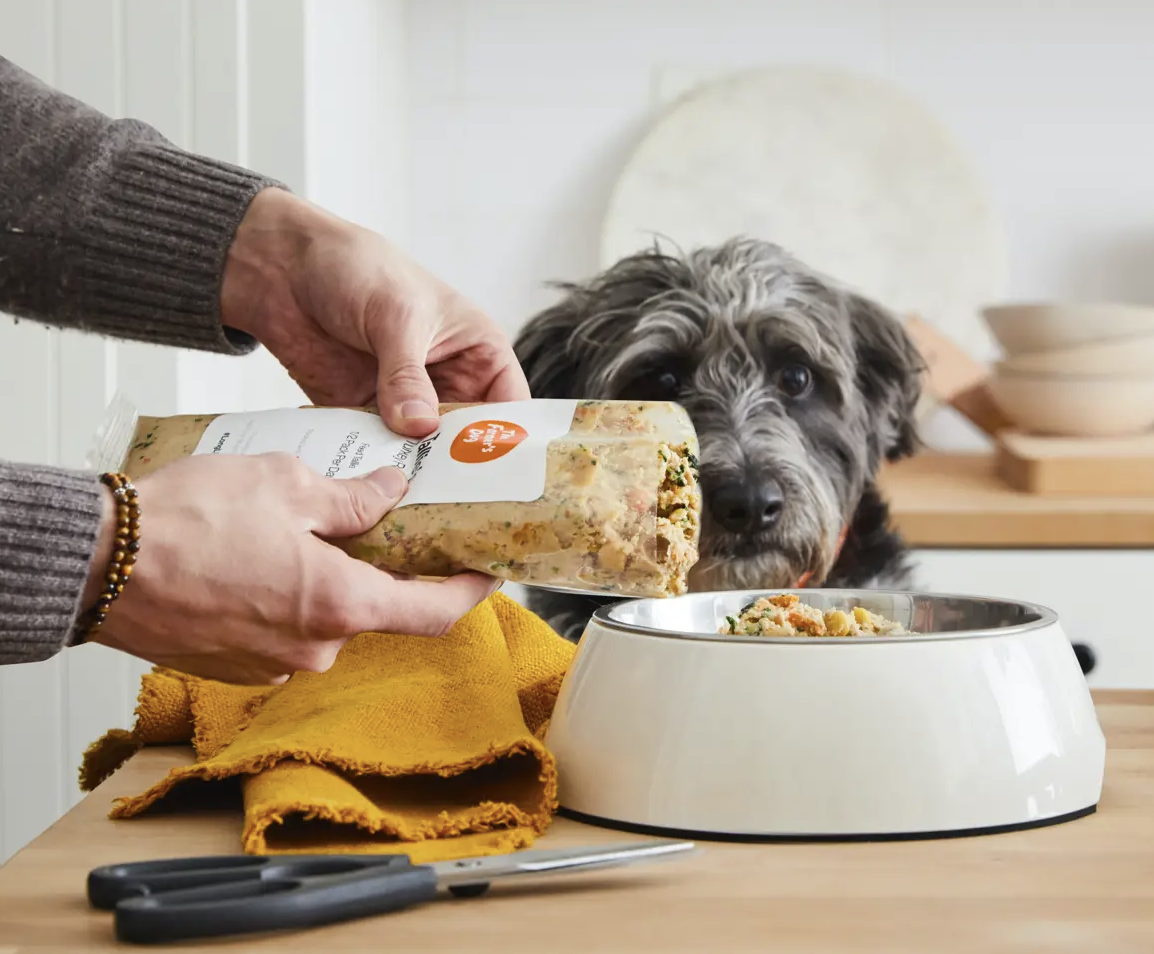
This is a fresh-frozen food that’s delivered to your home in just the right amounts for your dog. There are a number of fresh frozen dog foods available on the market and I tested them all. The Farmer’s Dog came up the winner with my picky dogs. You can see the fresh frozen food test here.
Save 60% on your first order
—
2. Sundays Food For Dogs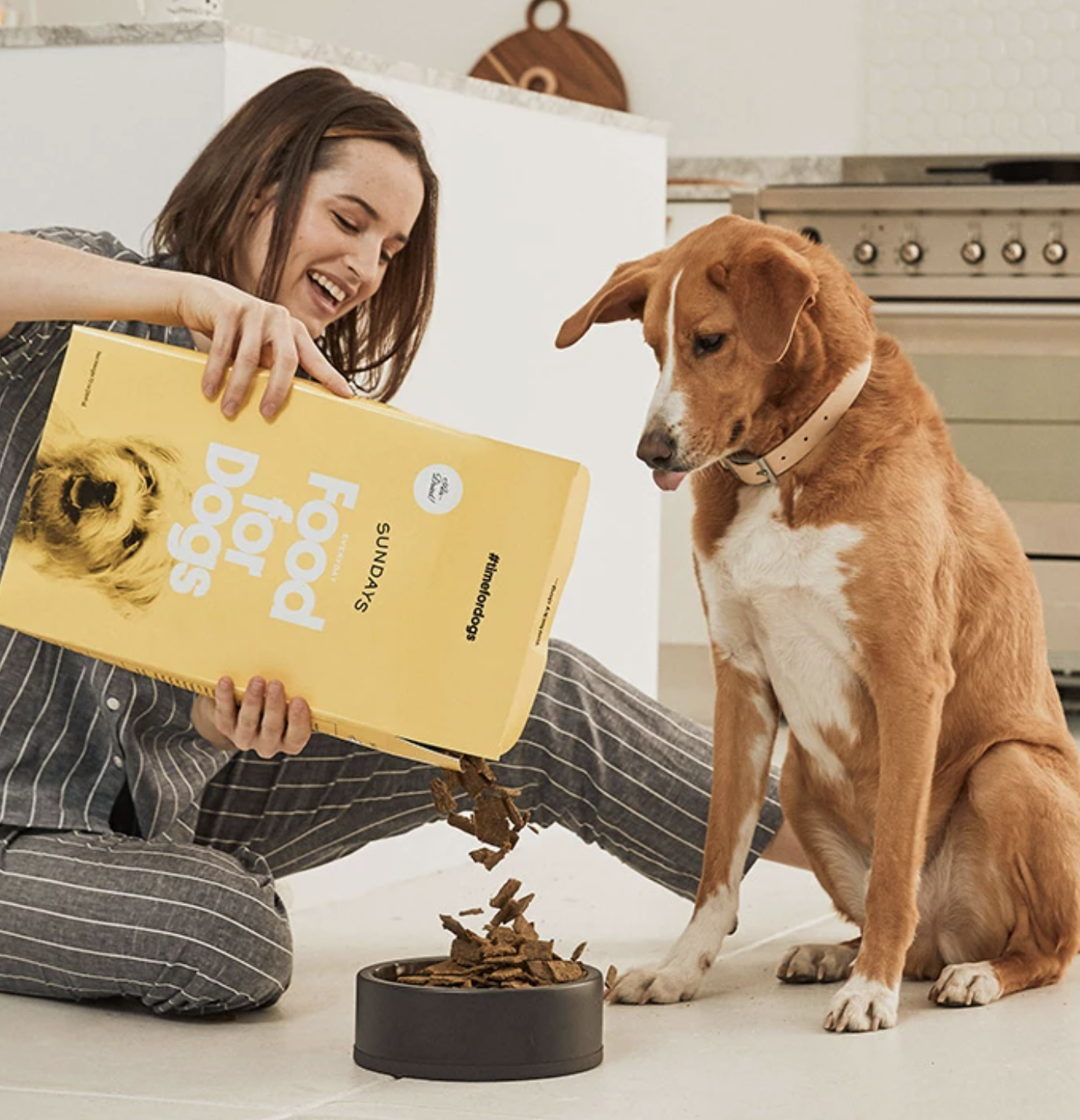
This is an air-dried food. It has the convenience of kibble (just pour it in the bow) but is much much healthier. It’s like little pieces of jerky, so dogs go crazy for it. There are a number of air-dried foods on the market. My dogs tested 3 of them. You can see the results of the air-dried food test here.
Get 35% off your first order + free shipping w/ code ROCKY35
3. We Feed Raw.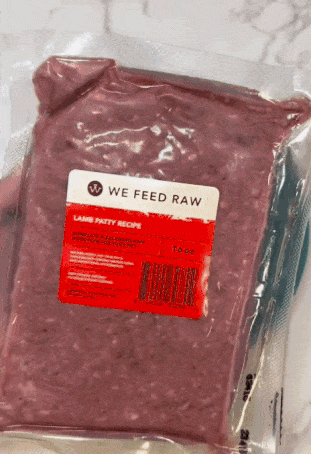
This raw food for dogs comes delivered to your home is perfectly sized portions for your pup. They primarily source their ingredients from trusted U.S. farmers, with two exceptions: venison and lamb. These ingredients are sourced from New Zealand, where some of the highest-quality and most ethically raised venison and lamb can be found. Pasture-raised and grass-fed and finished, we highly recommend trying these formulas if you’re interested in the best-quality ingredients. Save 25% on your first order.
Supplements: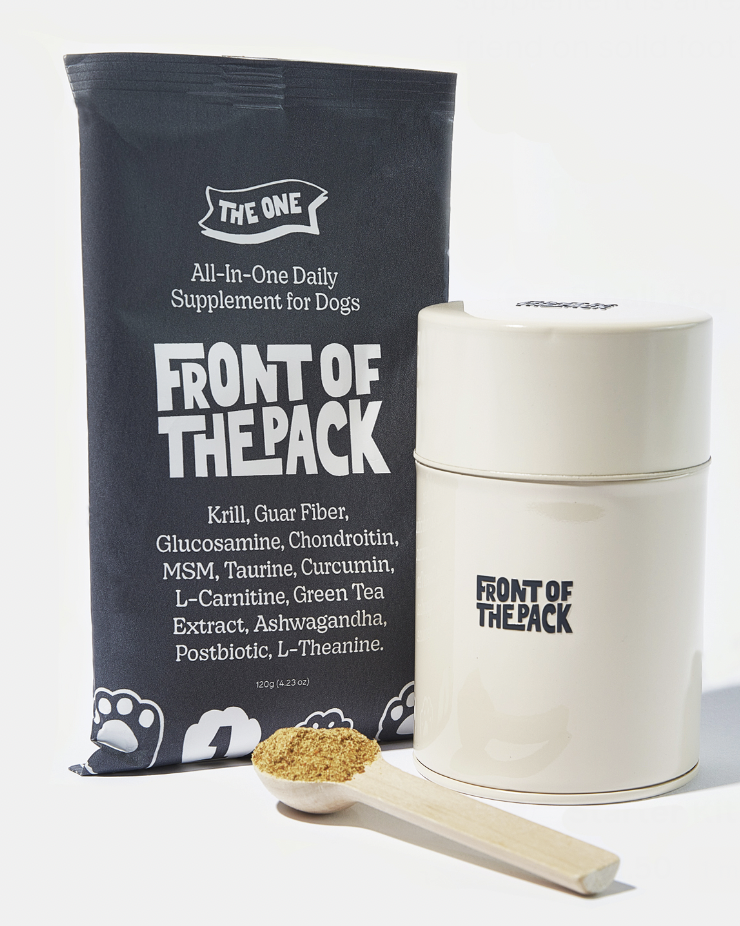
I highly recommend using a supplement on your dog’s food, not matter what you feed them, to ensure the meal is balanced and they are getting all the right supplements to help them stay healthy. The supplement I use is called The One from Front of the Pack. It has 12 ingredients that have been clinically-proven to keep your dog’s joints, skin, heart, digestion, and even their breath in tip-top shape. It’s also a powder, so easy to sprinkle on your dog’s food. For a limited time, when you buy one month you get a second month free.
If the marshmallow contains xylitol then you should take your dog to the vet asap. Xylitol is toxic to dogs. See section above. If the marshmallow doesn’t contain xylitol then likely nothing will happen to your dog. If they eat lots, there may be vomiting or diarrhea.
If it doesn’t contain xylitol then if your dog ate one marshmallow, they most likely won’t get sick. If your dog ate a mini marshmallow that doesn’t contain xylitol, even better, since they will have had less sugar and have less chance of getting an upset stomach.
Well, not all dogs like marshmallows. For the purpose of this article, I tried to give a little to my dogs. None of them would have anything to do with it. But they are small and picky.
If they contain xylitol then absolutely not. If they do not contain xylitol then your dog can have a couple and likely nothing will happen
If the marshmallow contains xylitol, don’t wait for symptoms to appear, it’s best to call poison control or a veterinarian.
Vegan marshmallows are the best ones to give your dog if they don’t contain xylitol. We recommend Max Vegan Mallow – sugar free, xylitol free, no artificial flavors.
No, Jet Puffed doesn’t have xylitol in its recipe, but these marshmallows still aren’t a good option for your pooch. If your dog eats one or two, they should be completely fine.
So, are Jet Puffed marshmallows safe for dogs? Yes, in moderation, but they shouldn’t be a go-to treat.
If your dog has eaten a large amount of marshmallows, the first thing to do is to check the ingredients. Next, call the vet, and they will give you further instructions depending on the ingredients list.
